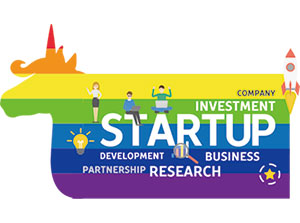- Home
- Investment Opportunities
- Sites
- Location Report
Location Report
In January 2018, the South Korean
government vowed to launch a KRW
2.6 trillion (USD 2.45 billion) investment fund for start-ups. The government also pledged to reduce taxes on profits gained from stock options for start-ups.
Additionally, broader financial support for
these new businesses was promised
recently as a part of the government plan
to help reduce the youth unemployment
rate. Drawing from recent news, it is not
an exaggeration to say that the government is making all-out efforts toward the
growth of start-ups. In hopes of becoming
a leader of The Fourth Industrial
Revolution, South Korea as well as other
advanced nations are increasingly seeking
to nurture start-ups as they are proving to
be the next growth engine.
Though South Korea has the reputation
of being one of the world’s most high-tech
countries, it has had a subpar start-up
ecosystem up until now. Most of the
promising Korean start-ups were e-commerce based, with only two considered as
“unicorns”, or start-ups valued at over
USD 1 billion. This is a small number for
such a technologically advanced country,
especially in comparison to its neighbor,
China, who hosts more than 50 unicorns.
It was time for South Korea to take a more
active role in diversifying and supporting
its start-ups.
Better late than never, though, as positive changes are being made in the country with the government pledging financial and administrative support and as the
nation’s vast technological resources and
human resources continue to develop.
Provinces are also making individual
efforts to host and foster start-ups.
Gyeonggi-do, a province surrounding
Seoul, has emerged as an ideal location
for those looking to start a business
because it offers fairly affordable living
costs while providing easy access to the
nation’s capital at the same time.
Gyeonggi Content Agency is actively
taking part in promoting the province as
the nation’s leading start-up zone. One of
its ventures is the Cultural Creation Hub,
referred to as “G-Hub.” Since 2014, the
Cultural Creation Hub enterprise has been
expanding to four regions within
Gyeonggi-do: Pangyo, Gwanggyo,
Euijeongbu and Siheung. Not taking into
account the Siheung hub, which just
opened, the three hubs have generated
over 270,000 visitors, 943 new businesses, 2,567 jobs, and have attracted KRW
29 billion of foreign investment for 43
start-ups.
Pangyo
The first Cultural Creation Hub is located in Pangyo. Covering 4,254 square
meters of land, the hub has generated
approximately 500 new businesses and
supported about 8,000 start-ups since
2014. It has 22 open spaces, which are
provided to start-ups for the duration of
six months to two years. The hub’s signature G-Start program is divided into five
stages which businesses are to follow
according to their varying levels of development. Stages A and B are mostly educational programs and mentoring sessions
that help realize ideas and suitable for
business. The following stages C, D and E
consist of extensive programs that range
from networking and financial support for
growth to overseas expansion.
In addition to the Cultural Creation
Hub, Pangyo opened Pangyo Techno
Valley in 2011, which is often dubbed as
Korea’s Silicon Valley. With more than
1,300 companies, the complex has been
growing rapidly, with an annual economic
output in 2016 estimated at KRW 77 trillion. To sustain this start-up momentum,
the Second Pangyo Techno Valley is
expected to finish construction by 2022.
As a way to accomodate the estimated
1,200 startups, the center proposed the
establishment of a Software Dream
Center, ICT Fusion Center and a Global
Biz Center. Like its predecessor, the
Second Pangyo Techno Valley will offer
affordable rent prices—80 percent of the
average commercial rent price in South
Korea—for start-ups that are three to seven years old. Furthermore, the Pangyo
Start-up Campus was launched in 2016 to
serve as a supporting facility for Pangyo
Techno Valley by offering workspace and
consulting services for more than 200 big
data, FinTech, IoT and mobile technology
start-ups.
Gwanggyo
Gwanggyo, the location of the second
Cultural Creation Hub, has been concen
trating on fostering Virtual Reality (VR)
and Augmented Reality (AR) start-ups.
Since its establishment in 2016, it has supported over 370 start-ups and trained over
500 individuals. It proudly operates the
NRP (Next Reality Partners) Program, in
which start-up companies with growth
potential are selected through an audition
and are guided through well-designed
acceleration programs for six months.
Consisting of legal consultation, mentoring, business classes and VR/AR classes,
this program consists of five stages similar
to that of Pangyo. Meanwhile, Gwanggyo
is seen as the next bio start-up hub. A bio
start-up campus is to be completed this
year, taking advantage of the fact that one-third of South Korea’s bio industry and
51% of the nation’s ICT companies are
concentrated in Gyeonggi-do.
Clearly, Gyeonggi-do is determined to
create a stable and productive start-up
ecosystem. Aside from creating thousands
of new jobs for young workers, thus vitalizing the nation’s economy, the G-Hub,
start-up campuses and Techno Valley will
be the core engines for South Korea to
emerge as a leader in The Fourth
Industrial Revolution. With such support
and excitement over start-ups, it is not farfetched to say that Gyeonggi-do might be
home to the next Korean unicorn.











